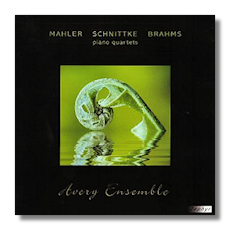
The Internet's Premier Classical Music Source
Related Links
-
Brahms Reviews
Mahler Reviews
Schnittke Reviews - Latest Reviews
- More Reviews
-
By Composer
-
Collections
DVD & Blu-ray
Books
Concert Reviews
Articles/Interviews
Software
Audio
Search Amazon
Recommended Links
Site News
 CD Review
CD Review
Quartets for Piano & Strings

- Gustav Mahler: Piano Quartet
- Alfred Schnittke: Piano Quartet
- Johannes Brahms: Piano Quartet #1 in G minor, Op. 25
The Avery Ensemble
Zephyr 001-B DDD 62:16
Here's a gorgeous CD that is somewhat off the beaten path, primarily because it will be difficult to find it in your local shopping mall. Don't let that deter you, though. Point your browser to CD Baby (cdbaby.com), the online store that is an independent musician's best friend, no matter with what genre he or she is associated. The asking price for this disc is $13.95 – not prohibitive!
Even if Mahler had not written all those world-embracing symphonies, his Piano Quartet, dating from 1876, would be of interest. To put it into perspective, Mahler was 16 at the time, although he was precocious enough to have been admitted into the Vienna Conservatory a year earlier. Needless to say, his First Symphony and even Das Klagende Lied still were several years off. Actually, this is an unfinished work; there are sketches for a Scherzo, but Mahler completed only the 11-minute Allegro movement recorded here. This is passionate stuff – in spirit, it is not unlike the first movement of Tchaikovsky's Piano Trio, although with a somewhat Brahmsian accent, and it doesn't sound like Mahler at all. It has been played and recorded more and more in the past several years, and I don't think anyone needs to make any excuses for it – it's a rich and enjoyable bit of writing.
But what about the Scherzo sketches? In 1988, Russian composer Alfred Schnittke decided that he would use them as the basis to a sort of sequel to Mahler's sole completed movement. Rather than composing counterfeit Mahler, though, Schnittke decided to put the sketches through his own wringer, and the results sound nothing like Mahler at any point in his career. Essentially, the movement is a conflict between Mahler, whose fragment is repeated 17 times, and Schnittke, who launches a post-modern polystylic assault on the fragment. Surprisingly, it is the fragment that perseveres at the movement's end, although the ending – and the conflict, if you will – is anything but conclusive. In short, this is an harrowing bit of music-drama that says a lot in the space of a few minutes.
Brahms' Piano Quartet #1 in much more familiar. It was completed in 1861, which makes it an early work too – predating the première of the First Symphony by 15 years. The Rondo finale, marked "alla Zingarese" or "in the style of gypsy music" is one of many examples of a Hungarian influence in Brahms' work. This is a lush, Romantic quartet; it's music you can sink your teeth into – not as severe as later Brahms, but definitely as caloric.
The Avery Ensemble consists of pianist Adriana Järvis, violinist Annie Trépanier, violist Steve Larson, and cellist Hans Twitchell. It has been in existence since 1999, and currently is the ensemble-in-residence for the Trinity-on-Main Arts Center in New Britain, Connecticut. Its members are associated with various educational institutions in Connecticut, and have made names for themselves as solo artists as well. I was extremely impressed with their playing on this CD. These are emotionally charged performances, and at times the playing is almost mad with excitement. At the same time, there's a wonderful feeling of collaboration here, which indicates that the musicians are listening to each other and keeping cool heads, even as their hearts are aflame. In an age in which "safe" and somewhat faceless playing is the norm, it is wonderful to hear an ensemble in which chances are taken and a little blood is spilled, and in which the performers clearly have passionate feelings about what they are playing. It's also exciting to hear such natural, present engineering. It's the sort of CD that makes you want to turn it up loud, and damn the neighbors. This is what loving music is all about.
In case it isn't obvious already, I'm very enthusiastic about this disc. The ensemble's website is www.averyensemble.org.
Copyright © 2008 by Raymond Tuttle




















